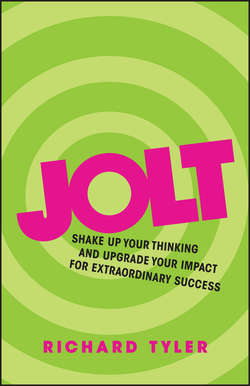Читать книгу Jolt - Tyler Richard - Страница 5
На сайте Литреса книга снята с продажи.
Introduction
ОглавлениеWith ordinary talent and extraordinary perseverance, all things are attainable.
Thomas Foxwell Buxton
This book will Jolt you. Not for the shock factor, but because the challenges faced by anyone in a leadership position are immense and in this new age there needs to be a better way to make an impact. Too many are busy ‘doing’, yet are not actually being productive. People are working longer hours than ever before, yet in that time, how significantly are they really transforming and innovating their space?
The luxury of just being ‘good’ and remaining a leader are gone and the consequences of failing to Jolt are severe – take Blockbusters, Jessops, Comet – why did they collapse? They stayed comfortable. They didn’t disrupt. They failed to lead.
On the flipside, look at Apple, Innocent, Dyson, Amazon – they are successful because they push at the edges and do dare to disrupt the industry standards.
Don’t be fooled into thinking you are safe. If you are not shaking up your industry now, someone else will be.
You, like me, will recognize that the world is moving at an extraordinary pace. Probably faster than ever before and the one thing we can be sure of going forward, is that the pace will only continue to accelerate. There was a time however, where you could pretty much be ‘good’ and feel ‘safe’ as a leader by predicting what you delivered last week, last month and even last year, would continue to be a success. ‘Let’s keep churning out the same as it’s worked for us before!’ Well those days have passed us by. Business schools focused on metrics, measurables and the bottom line. Case studies, reports and spreadsheets ruled!
The space we are in now has shifted beyond recognition and the expectation of what has to be delivered has multiplied. We can no longer rely on telling the story where leaders scrape by with knowledge alone, technical competency and a textbook approach – the world is ready and, in most cases, demanding something more. The requirement now is for organizations and their leaders to be led away from pure process, out‐of‐date habits and mediocrity and towards a hunger for embracing something extraordinary where the outcome is to transform and not just fix.
The ability to transform, however, requires so much more than simple technical knowledge. While that is important, it is only a small part of the story; courage, listening, noticing, intuition, improvisation and engaging others in transformation is the larger part. In your role as a leader today, it is not just about playing the notes well, but listening to what’s emerging in the spaces in‐between.
That final statement is key. A good musician will be competent at playing the notes and lots of them together. The same is true for many good leaders, they will also be capable of playing many notes and lots of them together. What differs for the extraordinary musicians is that they are the ones that stop and listen to the spaces in between the notes. This is the moment that becomes their choice point for creating an extraordinary narrative and ensuring it finds its way to landing with their audience. It is the moment when they hold the questions:
• What am I noticing?
• How can I build on this?
• What can I do to deepen my listening?
• How can I become even more of a contribution?
When did you last ask yourself the same questions?
It is not just about playing the notes well, but listening to what’s emerging in the spaces in-between.
In the business space we currently operate within, playing the notes is simply no longer enough: reliance upon banging out as many notes as you can is a high risk strategy that most cannot afford to take. Yet, still, many organizations continue to focus on developing only the behaviours and skills that fit with the ’old story’ – where the number of notes played in a day was the measure of success. It has all changed – the audience is now demanding that we deliver a more relevant and up‐to‐date story.
Just recently I read in the paper that John Cridland, director‐general of the CBI, has written a hard‐hitting report recommending that schools and the government pay far greater attention to developing the attitude and character of children while in education. The past and current focus is on exam results; more knowledge, more learning and more tick boxes, yet employers believe that an agile mind, emotional intelligence and the desire to go the extra mile are most important. Skills are much easier to instill if the attitude to learn and upgrade yourself is in place.
Here’s the thing – much of what you do already works well. It must or you wouldn’t have got this far in life. The question for you though is this: will it be enough to take you beyond where you are now in order that you can play with extraordinary?
The attitude and behaviours that made you good will not be the same ones that make you extraordinary – doing more of the same will not unleash your success.
